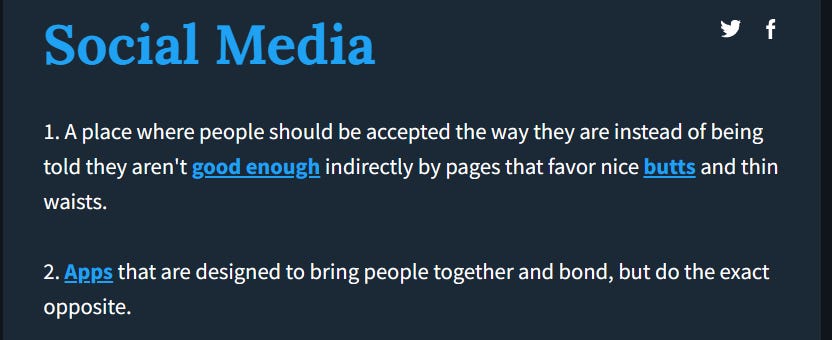‘I’m quitting social media!’
With an air of newfound liberation, I stood before my circle of friends, a sense of enlightenment coursing through me like a serene mountain stream. It was akin to the moment when a seasoned monk decides to forsake the distractions of the world and retreat into the tranquil seclusion of the mountains. "In times of dire need," I declared with confidence, "you need only reach out to me through my phone number."
Yet, little did they know, they would never have to invoke this decree, for the very next day, I would diligently reinstall all that I had temporarily shed.
When doing research for this blog, I realised the narrative “I quit social media and it changed my life” is having such great traction everywhere. There are thousands of websites talking about it, thousands of blog posts on Medium and Substack, and probably millions of Facebook posts telling their friends that they’re quitting social media.
I think that the common theme is that people treat social media like crack: they reach a breaking point, acknowledge the negative impact it's having on their lives, and then make the bold decision to quit. Society gently pats them on the back for taking such a drastic step.
I beg to differ. I think that social media fucking sucks, that’s true. But it does have its merits.
to quit or not to quit, that is the question
‘Quitting social media will bring benefits to your mental health’, this is a conclusion that I have read too often that it surprised me that scientists are still doing research on it.
to quit
happiness
Our happiness is paramount, yet paradoxically, we often find ourselves repeatedly engaging with something that could be eroding it: social media. Research consistently highlights the detrimental impact of excessive social media use on life satisfaction and overall well-being.
In essence, while we prioritize our happiness, we inadvertently subject ourselves to potential harm by frequenting platforms that may compromise it.
We know that spending more time on social media tends to make people less satisfied with their lives, but we're still not entirely sure why.
One idea that gets thrown around a lot is the whole social comparison thing. Basically, when you see everyone else on there posting about their amazing accomplishments and adventures, it can make you feel like your own life doesn't measure up. Like, they're only showing the good stuff, right? So, you end up feeling kind of inadequate, especially if your own life isn't all that exciting compared to what you're seeing online.
Maybe it’s time to conduct your own personal experiment: take a break or reduce your social media use to see if it boosts your mood.
sleep
Many of us struggle to get enough sleep, often finding ourselves wide awake at odd hours like 3 AM (me). Yet, when it's time to wind down for the night, we cozy up in our comfortable pajamas only to be greeted by the cold glow of our electronic devices. This seemingly harmless habit, however, can wreak havoc on our sleep patterns.
Blue light disrupts our sleep circle (no, your blue-light blocking glasses do not help). Research has shown that young adults who frequently check social media before bed experience more sleep disturbances as a result.
Considering the profound impact sleep has on our overall health, maybe let’s think again before bringing our phone to bed for some TikTok scrolls tonight.
self-worth
As mentioned in this post
almost every social media platform is now built primarily around the purpose of broadcasting your life to other people, and you are being broadcast. This design expose you to a constant stream of people’s polished lives
Almost every social media site where you have to put your face on has a wild collection of filters (hell, even Google Meet has filters). Filters, influencers, and photo editors, platforms like Instagram can set unrealistic standards that have been assholishly normalised, leading to feelings of inadequacy and unattractiveness, particularly among women.
Studies have shown that viewing others' selfies often triggers negative self-comparisons, contributing to a sense of dissatisfaction with our own lives.
Moreover, platforms like LinkedIn can exacerbate feelings of professional and relational inadequacy as we compare ourselves to others' seemingly more successful careers and relationships. The relentless barrage of seemingly perfect lives depicted online can easily distort our perceptions of reality.
It's crucial to remember that almost everything people post on social media is only a tiny, teeny aspect of their lives, only the most beautiful part of it, the most successful part of it. Behind every post lies a human being with their own challenges and insecurities, though it's worth noting that not all posts are genuine, given the prevalence of bots. Keeping this perspective in mind can help mitigate the negative effects of social media on our self-esteem and overall well-being.
to not quit social media
Frankly, this argument is not as common. There’s research pointing out that social media abstinence might not affect our mood at all. And you’re not going to shake up your social networks when you post, “I’ve decided to continue using social media at my current pace!” But particularly in our current reality, there are advantages to using social media, provided you do it judiciously.
FOMO
The human need to belong is key to survival when we’re still primitive, because at that time, if you’re isolated from any communities whatsoever, your likelihood of dying is pretty high. Nowadays, not having any friends doesn’t make you instantly drop dead, but that need for socializing still continues to dictate our behaviour today. Social media capitalizes on this.
Social media is a double-edged knife. It lets us interact with others, which is good, but it also exposes us to more social opportunities than we can take part in and that fosters a sense of missing out and inadequacy
As we age and our lives become busier, social media often becomes a primary channel for staying connected with friends and family, especially when geographical distances separate us. Fear of Missing Out (FOMO) is a real concern, particularly for those accustomed to social media as the primary mode of communication.
Quitting social media means potentially missing out on important life events like pregnancy announcements, engagements, baby pictures, and other significant updates from loved ones. It also means being disconnected from the latest memes, adorable kid antics, and amusing cat videos that populate our feeds.
While it's possible to stay in touch through traditional means like calls and texts, social media offers a convenient way to effortlessly stay updated with the lives of those we care about. Without it, there's a risk of feeling out of touch and isolated from the ongoing events in the lives of friends and family.
network
Social media has helped us break down our geographical and ideological barriers and connect with people we wouldn’t be able to otherwise. Sure, that means some overly intense political and sports opinions find their way into your feed, but it also allows you to learn about groups and opinions you don’t see in your everyday life. I’ll make tons of great friends that I’m not crediting social media enough, those that I would never “meet” if it weren’t for Zuckerberg.
Particularly if you live in a remote or non-diverse area, social media can expose you to people and viewpoints you simply wouldn’t encounter where you live. Ideas about new books, movies, activities and interests all help to create a more well-rounded view of the world. If you’ve recently moved, social media can help you build a network around common interests or causes.
And while LinkedIn can be kind of a punchline online, if you sift through the spam and use it to your advantage, it can be a worthwhile networking tool and resource for professional development. And depending on your industry, Twitter, Instagram, or lesser-known platforms can be just what your business needs to reach that next rung of success.
what matters
Social media is like a knife; whether you use it to cut fruits for your people or cut people depends on how you use it.
When used judiciously, social media can serve as a conduit for staying connected with loved ones, gaining valuable insights, providing support, and participating in meaningful activities like private movie screenings, volunteer events, etc
However, indiscriminate usage leading to sleep disturbances or withdrawal from real-world interactions can detrimentally impact overall well-being. Moreover, individuals prone to feelings of envy or FOMO (fear of missing out) may experience mood disturbances as a result of excessive social media exposure.
Instead of solely focusing on cutting out social media, prioritizing a diverse range of activities in your life can foster a sense of equilibrium. By engaging in activities that bring fulfillment and joy, you naturally allocate less time and attention to social media. This shift allows you to be more present and engaged in real-life experiences.
We’ll have to admit that for the majority of us, social media is significant, and it’s not like we have the option to just turn everything off completely and enjoy life like it was 20 years ago. Social media serves as a vital avenue for connecting with friends, both nearby and far away. For many, it's not just a virtual space but a genuine reality where friendships, relationships, and life experiences are cultivated.
Things change. A lot of things now happen on social media, including work, family, and friends. And we’ll pay a price for missing out on all of that.
Social media has undeniably served as a vital connector for numerous friend circles, social gatherings, and community networks. While it's tempting to consider quitting social media altogether, a more balanced approach might involve maintaining access to these valuable connections while shifting the focus elsewhere.
It's like ensuring it's just a slice of the social pie, a substantial one, even, but not the whole damn thing. We humans still crave those real-life connections that go beyond likes and comments—those face-to-face moments, those shared experiences, that hug.
Simply disengaging from social media may not be a panacea, especially for those already feeling socially connected. In fact, it could potentially exacerbate feelings of isolation. Instead, the path to improved well-being may involve a gradual shift towards healthier habits over time.
Ultimately, while stepping back from social media can offer certain benefits, sustainable improvements in happiness and well-being are more likely to stem from the deliberate cultivation of balanced digital behaviors over an extended period of time.
In other words, changes in happiness likely come from broader changes in lifestyle and perspective, such as social media, exercise, or changes in mindset. Sometimes the challenges and adjustments of disconnecting from social media may contribute to greater anxiety initially. This may subside over time. Additionally, fear of missing out on social activities or discomfort due to change itself may offset or cancel out some of the benefits of disconnecting from social media.
But when we talk about treating social media like a slice of pie, make sure it's a good slice. There’s just tons of junk and toxic ingredients floating around on social media, like bullying, unnecessary arguments, or all the drama du jour. And even if it's a healthy slice, too much of it can leave you feeling queasy—mentally and physically.
As research continues to unfold, understanding the nuanced effects of social media on well-being will become increasingly vital in fostering a healthy balance between virtual and real-world interactions.
Thank you for reading until this part.
I would like to thank my friends for giving me valuable insights upon writing this post, without your help, I would not have completed it.
If you find this post helpful, please share it with your friends.
If you have any experiences regarding deleting/deactivating your social media, please tell your story dơn below.
I wish you a nice weekend.








"Social media is like a knife; whether you use it to cut fruits for your people or cut people depends on how you use it." --> Love this!
blog này đẹp thí. tác giả ngày càng invest nhỉ=)))